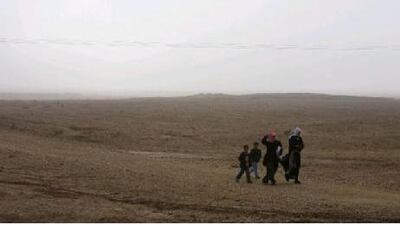DAMASCUS// Immediate action is needed to stop a water crisis in Syria from getting worse, international experts have warned.
The recommendation came after a Damascus conference on water use reported that national supplies had been cut in half between 2002 and 2008, partly through high rates of wastage.
During that six-year period, water resources fell from a relatively comfortable annual level of 1,200 cubic metres per person to fewer than 750 cubic metres, according to figures presented by researchers. The 700-cubic-metre threshold puts a country in the ranks of those unable to meet domestic demand.
Scientists and water engineers at the conference, which concluded last week, expressed alarm that Syria, until recently considered water rich for the Middle East, had so rapidly moved to the brink of scarcity. They said the country could meet its needs only if less water was wasted.
"What upsets me are the inefficiencies in the system, and that's not excusable," said Ghassan Ejjeh, the conference chairman and a leading expert on water reuse. Based in Brussels, he was born and grew up in Damascus, a place he remembers as once lush with orchards and streams, conditions he contrasted with today's car-dominated urban crush.
"Being short of water when there is nothing you can do about it is one thing, but it's quite another to be short when the situation could be alleviated through better use of supplies," he said. After the conference, arranged by the Levant Desalination Association and Nosstia, an organisation of expatriate Syrian scientists, Mr Ejjeh rejected suggestions that Syria had not reached a crisis point: the figures "speak for themselves".
"You can call it whatever you want, but as things stand, Syria doesn't have enough water to meet its needs," he said. "If they have 750 cubic metres a year, that's a water crisis and it will quickly become something worse unless action is taken. Supplies dropped from 1,200 cubic metres to 750 very quickly and at that rate, there is going to be a real problem very soon."
Syria's eastern Jazeera region, the country's breadbasket, has suffered from four years of drought so devastating that international aid agencies have been handing out emergency packages to feed the local population. The UN estimates that 600,000 people have fled because of water shortages.
The north-eastern province of Hasika has been hardest hit, with the Khabur River, once a major water source in the area, now dry. The effect of the drought, considered a result of global climate change by environmental experts, was magnified by years of poor water management, according to Fouad Abousamra, a United Nation's scientist who gave a presentation at the Damascus conference "The issue started in the north-east with an excessive extraction of water from groundwater supplies, then, slowly with climate change and the reduction of rainfall, the problem was amplified," he said.
Mr Abousamra, who is also Syrian, said the country could "not afford to wait" to address water problems in the north-east, although he characterised the situation as less pressing in Damascus. The problems can be solved with "proper management, clear policies and it will take money", he said. "The government knows how serious the problem is and they are beginning to take some steps, but more needs to be done."
Senior government officials have stressed the need for more effective water policies and, on Monday, Nader al Bunni was replaced as irrigation minister by George Malaki Sawmi, a leading Syrian authority on the subject. He has been tasked with pushing through an extensive modernisation plan. Experts criticised Syria's inefficient techniques for agricultural irrigation, which accounts for 80 per cent of Syria's water use. Out-dated irrigation methods mean more than 70 per cent of that amount goes to waste.
Nidal Hilal, a leading water scientist from Swansea University in the UK, said cutting waste would be a simple and effective way of stemming the water crisis. "People are using water excessively," he said. "The message of reduce, recycle and reuse needs to be heard in Syria, from the young people in schools right up to the highest authorities." Since 2002, Syria has been developing a major engineering plan to pump water from its western coastal area to Damascus. Engineers at the conference dismissed it as expensive and complicated.
"Syria is in a good position compared to many countries in the region, and should not look for new sources of water or dig more wells or get involved in expensive desalination plants," Mr Hilal said. "For now we should look to the water that is available and just use it better. That will go a long way to dealing with this matter."
psands@thenational.ae
This article has been altered to reflect a misleading statement about the high rates of water wastage in Syria.

Syria's water shortage causes alarm
Immediate action is needed to stop a water crisis in Syria from deepening, international experts warn.
Most popular today
9
